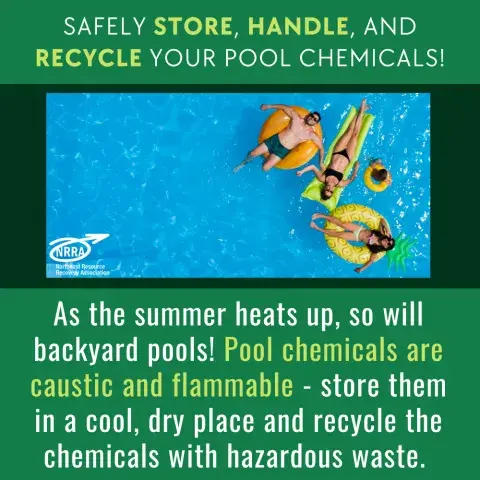
SUMMERTIME SAFETY: POOL CHEMICALS
Did you know that improperly disposed of pool chemicals are increasingly causing fires at transfer stations in the summer? Pool chemicals do not belong in household trash. They should be saved for proper disposal at your local household hazardous waste day. Please help your local solid waste operators stay safe this summer!
MORE INFORMATION FROM RECYCLE NATION:
"When storing pool chemicals, it is extremely important to keep them dry and not allow them to get too hot. Moisture and heat are both elements that can trigger bad reactions, such as fires and toxic fumes. Place pool chemicals on a shelf away from windows, doors or anywhere else they could get wet. Make sure you close the containers securely, and replace cracked or broken containers as soon as you spot them. Do not store them in an area that gets extremely warm. It is never a good idea to mix chemicals together, even if they are same type. Even though the different types of substances end up mixing in the pool, putting the concentrated versions together can cause fires. If you have a partially empty container of a pool chemical, do not add it to a new container; that can also lead to problems. Make sure you know what to do if pool chemicals get in your skin or your eyes. Consider posting that information near the chemicals if people unfamiliar with pool chemicals might handle them. Also, if your pool chemicals do cause a fire, do not try to extinguish it yourself. Chlorine fires in particular are tough to put out and can react with the chemicals in fire extinguishers. Call the fire department immediately and await instructions."
READ MORE: https://recyclenation.com/2014/10/recycle-swimming-pool-chemicals/
This material is based upon work supported under a grant by the Rural Utilities Service, United States Department of Agriculture. Any opinions, findings, and conclusions or recommendations expressed in this material are solely the responsibility of the authors and do not necessarily represent the official views of the Rural Utilities Service. Rural Community Assistance Partnership, Inc., is an equal opportunity provider and employer.
